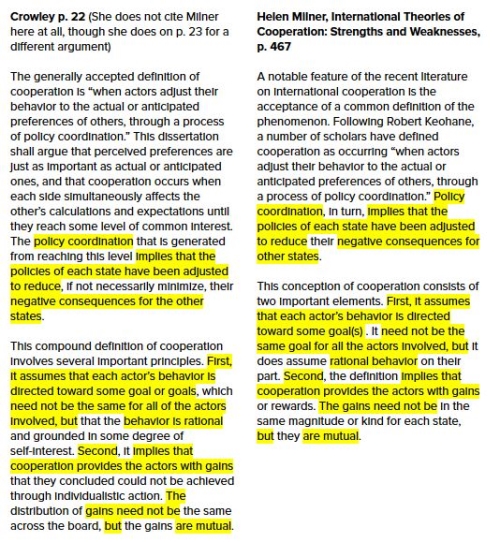Users #DeleteUber
Uber users aren't happy with the company's surge pricing during a New York City taxi protest. NYC yellow cabbies delayed JFK airport pickups for an hour to protest President Trump's ban on travel from predominantly Muslim countries.
Trouble started for Uber when its pricing tool showed higher prices because of the shortage. Uber says it was automatic-not intended to take advantage of the taxi drivers' decision. The company also suspended the surge but not before #DeleteUber started trending.
Meanwhile, Uber CEO Travis Kalanick posted a call for support for drivers affected by the ban on his Facebook page.
A Yahoo story, "The Day Lyft Was Bigger than Uber," explains that some users have been favoring Lyft since Kalanick joined Trump's advisory board, while others became fans when Lyft donated $1 million to the American Civil Liberties Union (ACLU), which has been at the forefront fighting the president's new policies. The uptick for Lyft was significant: "... data from third-party app tracking firm App Annie indicates Lyft surpassed Uber in the US on Sunday for most app downloads on iOS in the US in a single day - more than twice the number of times people downloaded Lyft just two weeks prior. Downloads for the Android version of Lyft's app in the Google Play store also saw a significant boost that day."
Discussion:
- Some say boycotting Uber isn't the best way to protest, particularly because the CEO is against the president's actions. What do you think?
- Assess Kalanick's statement on his Facebook page. What are his key messages?
- How do you feel about Uber? Do you buy the argument that the surge pricing wasn't capitalizing on the taxi protest?
CEOs Respond to Trump's Executive Order
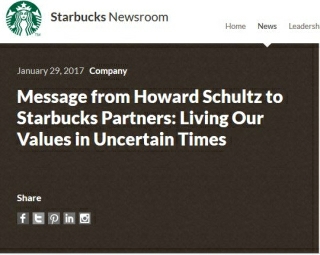 The New York Times reports "Frantic Phoning Among CEOs" about how they should address President Trump's ban on travel from Muslim-majority countries. Leaders want to oppose the ban but are concerned about "poking the bear," according to the article. The new president has taken tweet jabs at others, for example, the union leader involved in Carrier negotiations when he spoke out.
The New York Times reports "Frantic Phoning Among CEOs" about how they should address President Trump's ban on travel from Muslim-majority countries. Leaders want to oppose the ban but are concerned about "poking the bear," according to the article. The new president has taken tweet jabs at others, for example, the union leader involved in Carrier negotiations when he spoke out.
In a statement on the Starbucks website, Schultz opposed initiatives around DACA, building a wall, the Affordable Care Act, and immigration. He pledged to employ 10,000 refugees.
Mark Zuckerberg and Tim Cook also have come forward. Cook focused on Apple, of course: "In my conversations with officials here in Washington this week, I've made it clear that Apple believes deeply in the importance of immigration - both to our company and to our nation's future. Apple would not exist without immigration, let alone thrive and innovate the way we do." Other tech company leaders have weighed in their opposition: Airbnb, Uber, Lyft, Facebook, Google, Apple, Amazon, Expedia, and Microsoft.
The Times called financial firms' response more "moderate." For example, Lloyd Blanfein of Goldman Sachs said, "For us to be successful, our men and women must reflect the diversity of the communities and cultures in which we operate. That means we must attract, retain and motivate people from many backgrounds and perspectives. Being diverse is not optional; it is what we must be."
The article also noted energy and heavy industries' "mixed-bag" response, consumer and retail companies' resistance, and media and telecom's "no comment."
Discussion:
- What risks and rewards do CEOs face in addressing the travel ban?
- Why are industries responding differently? What does each have to lose or gain?
- Assess Howard Schultz's statement. While others are questioning how and whether to respond, he is on it. Why?
Kraft Heinz Gets Mixed Reviews for Holiday
 Kraft Heinz won't have a commercial in this year's Super Bowl, but the company will give employees Monday off. Joking that the day after, #SMunday, should be a national holiday, Heinz started a petition on change.org:
Kraft Heinz won't have a commercial in this year's Super Bowl, but the company will give employees Monday off. Joking that the day after, #SMunday, should be a national holiday, Heinz started a petition on change.org:
"We can all agree that going to work the Monday after the ‘Big Game' on Sunday is awful," the petition states. "So as far as we're concerned at Heinz, we as a nation should stop settling for it being the worst work day of the year. We don't settle for that awesome football Sunday to be just like every other day of the year."
They're certainly getting mainstream press, for example, in The Washington Post, but the article refers to the move as a "Super Bowl stunt."
The company recently laid off thousands of workers, and the day off isn't available to factory employees. Some social posts call the campaign "pandering" and one tweet reads, "I think we have bigger things to worry about."
Discussion:
- What's your view of the campaign: pandering, clever, inappropriate, or something else?
- What about the timing? News from the Trump Administration is heavy is week.
Dippin' Dots Responds to Spicer
 White House Press Secretary Sean Spicer has periodically blasted Dippin' Dots via tweets over the years. Now the company has responded in an open letter.
White House Press Secretary Sean Spicer has periodically blasted Dippin' Dots via tweets over the years. Now the company has responded in an open letter.
In an NPR interview, the CEO of the ad agency said they were concerned about getting in the political mix, but people were expecting the company to respond, so they had little choice. The company executives decided how to respond: "Scott Fischer, the CEO of Dippin' Dots, and his executive team wanted to openly address the issue in a way which was transparent and stayed true to their brand values – fun, community, and camaraderie."
Dippin' Dots offered to serve the White House and press, but Spicer suggested treating the military and first responders. It's not clear how this might happen.
Discussion:
- How well did Dippin' Dots handle the situation? What were the risks?
- It sounds as though Dippin' Dots responded because of the social outcry. Should the company have jumped into the conversation with Spicer earlier? How could they have done this?
VW Culture Change Agent Resigns
 About a year after she was hired, the Volkswagen head of compliance has left "by mutual agreement." A New York Times article reports that Christine Hohmann-Dennhardt, previously at Daimler, joined the board in January 2016 and "was responsible for integrity and legal affairs." The article further reports on the significance of her hire and departure:
About a year after she was hired, the Volkswagen head of compliance has left "by mutual agreement." A New York Times article reports that Christine Hohmann-Dennhardt, previously at Daimler, joined the board in January 2016 and "was responsible for integrity and legal affairs." The article further reports on the significance of her hire and departure:
Volkswagen presented Ms. Hohmann-Dennhardt's departure as one that was mutually agreed on. But the loss of a rare outsider in the top ranks underscores the insular nature of the company.
Its stock is held by a small number of shareholders: Two families, a German state and the government of Qatar jointly hold about 90 percent of Volkswagen shares. That leaves outside investors with little voice and results in a management board typically made up of insiders with a long track record at the carmaker.
Ms. Hohmann-Dennhardt had been an exception.
"No matter what spin they put on" her departure, said Jeff Thinnes, a former Daimler executive who advises European companies on compliance and ethics issues, "the optics couldn't be worse."
A statement on VW's website compliments Hohmann-Dennhardt's contributions: "The Supervisory Board thanks Dr. Hohmann-Dennhardt for contributing her outstanding expertise and experience to achieving important milestones, and for supporting the Group in revising its internal guidelines and procedures." The company also promises ongoing changes:
Volkswagen will continue to press forward with changes to its way of thinking and working. The Group has substantially elevated its commitment to working ethically and with integrity and is decentralizing its organization. Brands and regions already have much more autonomy with regard to their operating business. These and other initiatives are part of a broader transformation of Volkswagen's corporate culture to create a more entrepreneurial and international organization.
Discussion:
- Some hires just don't work out. What do you think happened here?
- How well did VW handle the messaging? Read the full statement.
- To what extent do you agree with the Times' assessment? Did the article overstate the damage of Hohmann-Dennhardt's termination?
Boeing Profits Up
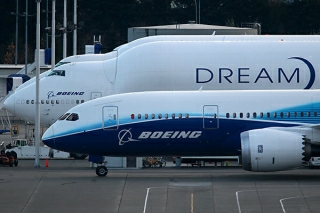 After facing critical tweets from President Trump about its expensive military planes, Boeing reports quarterly profits better than expected. But the uptick is from commercial plans, a market Boeing is leading.
After facing critical tweets from President Trump about its expensive military planes, Boeing reports quarterly profits better than expected. But the uptick is from commercial plans, a market Boeing is leading.
Boeing's fourth-quarter press release included a few cheery statements from Chairman, President and Chief Executive Officer Dennis Muilenburg:
"With solid fourth quarter operating performance and a sharp strategic focus, we extended our aerospace market leadership in our centennial year and positioned Boeing for continued growth and success in our second century."
"We led the industry in commercial airplane deliveries for the fifth consecutive year, achieved healthy sales in our defense, space and services segments, and produced record operating cash flow, which fueled investment in innovation and our people and generated significant returns to shareholders."
"Looking forward, our team is intent on accelerating productivity and program execution to deliver increasing cash and profitability from our large and diverse order backlog of nearly $500 billion, standing up our new integrated services business, and capturing an even greater share of the the growing global aerospace market to deliver superior value to our customers, shareholders and employees."
Bloomberg reports Boeing shares at record high and that the "787 Dreamliner emerged from a decade of losses." The article quotes an analyst: "We think this release is pretty boring -- and boring is good."
But Fortune warns, "Its overall outlook for 2017, however, is not likely to inspire confidence. Boeing is calling for adjusted earnings between $9.10 and $9.30 this year, which is below the $9.31 that Wall Street analysts were projecting. The company expects revenue will fall to somewhere between $90.5 billion and $92.5 billion, compared to $94.6 billion in 2016."
Discussion:
- We see a lot of jargon in the press release. Is it appropriate or off-putting?
- What does the analyst mean by the "release is pretty boring." Should it be more exciting? It is, after all, good news.
- What are the dangers of the Boeing CEO quotations being overly optimistic, as the Fortune article warns. What's the best approach here?
Uber Pays $20M for Misleading Drivers
 Uber has been in the news several times for questionable business practices. Now, the company will pay $20 million to drivers because of a suit by the US Federal Trade Commission.
Uber has been in the news several times for questionable business practices. Now, the company will pay $20 million to drivers because of a suit by the US Federal Trade Commission.
Ads on Craigslist and promotions on the Uber website boasted, "the potential income a driver on UberX can make in a year is more than $90,000 in New York and more than $74,000 in San Francisco." Boston drivers, Uber said, could make $25 per hour. But that is rarely the case: less than 10% of drivers in Boston earned that much, and drivers in NY and SF made, on average, $61,000 and $53,000.
Critics say Uber shifts risk and other expenses, such as car purchases, gas, and repairs to drivers, who don't reap the advertised benefits.
The company disputes how the FTC calculated income and responded to the settlement:
"We're pleased to have reached an agreement with the FTC
"We've made many improvements to the driver experience over the last year and will continue to focus on ensuring that Uber is the best option for anyone looking to earn money on their own schedule."
Discussion:
- What is your experience with Uber as a company? How does this news factor into your view of Uber?
- What could be the discrepancy between how Uber calculates income and how the FTC sees the situation? How credible do you find Uber's argument?
Analysis of Trump's Inauguration Speech
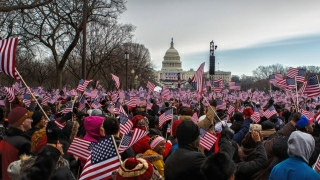 Both sides of the aisle seem to agree that President Trump's inaugural address was short and "militant," but analysts disagree on the effect.
Both sides of the aisle seem to agree that President Trump's inaugural address was short and "militant," but analysts disagree on the effect.
NPR's analysts comment on the speech line by line, with some taking issue with his points; for example, he discusses inequities, yet, as one reporter explains, "It's worth noting that despite Trump's anti-establishment message and his frequent promises during the campaign to "drain the swamp," Trump's Cabinet picks so far have included several billionaires and Washington and Wall Street insiders, including billionaire Betsy DeVos, former Goldman Sachs executive Steve Mnuchin, former Exxon Mobil chairman and CEO Rex Tillerson, and countless current and former elected officials."
Fox News host Bill O'Reilly lauds the president's speech, particularly his jabs at the Obama Administration. He also notes that the president criticized President George W. Bush's Iraq and Afghan wars:
"George W. Bush was seated just a few feet away from President Trump. So it's clear that Donald Trump has no sensitivity to the politics of the past, no matter who was in office. His message was directed to his supporters, to the folks, who are fed up with a political process they believe is not helping them."
O'Reilly called it "more like a campaign speech than a presidential address."
Discussion:
- What's your view of the speech? How do your political views influence your opinion?
- Analyze the language choices in Trump's speech. He uses several rhetorical devices.
How to Erase a CEO
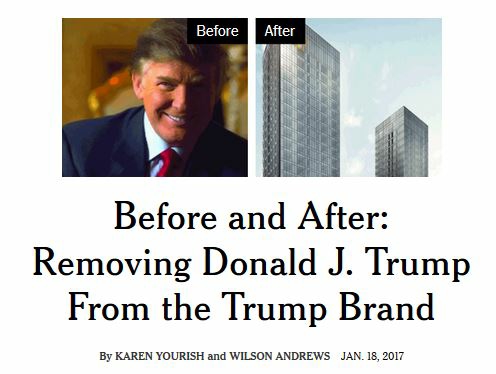 The Trump organization has revamped its websites to remove images of the President-Elect and his daughter, Ivanka. The New York Times shows several "before-and-after" screenshots of his company's websites. As Trump is in the midst of detaching himself from his businesses to avoid conflicts of interest, these changes seem to be mere gestures to some legal experts.
The Trump organization has revamped its websites to remove images of the President-Elect and his daughter, Ivanka. The New York Times shows several "before-and-after" screenshots of his company's websites. As Trump is in the midst of detaching himself from his businesses to avoid conflicts of interest, these changes seem to be mere gestures to some legal experts.
Norman Eisen, former chief White House ethics lawyer for President Obama, said, "The problem is, like all of the Trump conflict remedies, these are half-measures and Band-Aids that tape over a gaping wound. Until Mr. Trump definitively severs his ownership with these businesses, the conflicts and the myriad of controversies and risk of scandal and corruption that flow from them are going to continue unabated."
Still, the photos show dramatic differences for several Trump Towers and Trump Hotels, Trump International Realty, Trump.com, and Trump Golf.
Discussion:
- The Times article shows several Trump family images still on his websites. Should they all be removed? Try to argue both sides of this issue.
- Many images were removed in just the past two days, according to the Times article. Is the timing important for the imminent inauguration, or doesn't it matter?
- How do you think removing these images from these sites will affect the family businesses, if at all?
Diversity Training at Delta
 In response to two recent incidents, Delta crew members will attend diversity training that company executives already attended.
In response to two recent incidents, Delta crew members will attend diversity training that company executives already attended.
In one situation, CEO Ed Bastian banned a passenger after seeing a video of him yelling about Trump. In a statement, the company said the passenger should not have been allowed to fly. In another situation, covered by BizCom, an African-American doctor was questioned about her credentials and discouraged from helping a sick passenger.
The planned program includes unconscious bias and microaggressions-two current topics in diversity and inclusion circles. That's good because traditional diversity training programs haven't been found to be effective. A 2012 HBR article, "Diversity Training Doesn't Work," faults programs for causing more problems than they solve, and a 2016 BizCom story reiterated the point covered in a 2016 article.
Discussion:
- What's your view of diversity training programs? Are you skeptical like me?
- How could covering topics of unconscious bias and microaggressions be different?
- What difference do you think the training will make at Delta?
VW's Winterkorn Responds to Questions
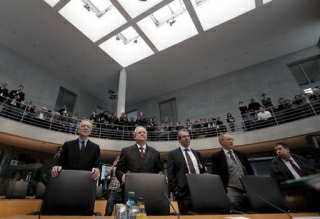 Martin Winterkorn, Volkswagen's former CEO, responded to what the The New York Times calls "polite grilling" by the German government about the emissions scandal.
Martin Winterkorn, Volkswagen's former CEO, responded to what the The New York Times calls "polite grilling" by the German government about the emissions scandal.
Winterkorn has a tough time defending himself when the company already admitted using software to cheat emissions tests. Several executives were indicted, including many who reported directly to him. As the Times reports, "Volkswagen's plea agreement with the Justice Department in Washington last week left no doubt that the fraud was the work of dozens, if not hundreds, of employees, rather than the result of a handful of rogue engineers as the company had first claimed."
But Winterkorn said he didn't know about the "defeat device" and "never did I have the impression that anyone was afraid to speak an open word with me." The Times article further questions the likelihood that Winterkorn knew nothing:
There is some reason to doubt Mr. Winterkorn's assertion. Mr. Gottweis, a Volkswagen executive who specialized in solving technical emergencies around the world, warned in a memo in May 2014 that American regulators were likely to investigate "whether Volkswagen implemented a test detection system in the engine control unit software (so-called defeat device)."
The memo was included in a stack of weekend reading given to Mr. Winterkorn at the time, but Volkswagen has said it was not clear if Mr. Winterkorn had read it. Mr. Gottweis reported directly to Mr. Winterkorn, however, and it is deemed unlikely that a warning from an executive known internally as "the fireman" would have been ignored.
Discussion:
- Do you believe Winterkorn's stance? Why or why not?
- How does Winterkorn benefit from continuing to deny knowledge of the defeat device? If he is lying, what are the potential consequences to him personally and professionally of admitting the truth?
- Some see this testimony as a missed opportunity for Volkswagen. Can you explain this point of view?
APA Responds to Book Controversy
 Japanese Hotel Group APA placed copies of a book written by the company CEO in all hotel rooms. Sounds nice, but the book calls the 1937 Nanjing massacre of 300,000 Chinese troops and civilians by the Japanese a "fabrication."
Japanese Hotel Group APA placed copies of a book written by the company CEO in all hotel rooms. Sounds nice, but the book calls the 1937 Nanjing massacre of 300,000 Chinese troops and civilians by the Japanese a "fabrication."
APA Founder Toshio Motoya wrote under a pen name but admitted to writing the book and having them distributed throughout the group's 370 budget hotels. A hotel guest's video showing the book content went viral on Weibo with 95 million views, according to Skift. At least one Chinese travel company in Japan stopped booking guests in APA hotels.
A spokesperson for the Chinese Foreign Ministry, Hua Chunying, said, "This once again shows that some forces in Japan are still reluctant to look squarely at history, and even try to deny and distort history."
APA responded in a statement, translated here. In this excerpt and throughout the statement, the company makes no apologies:
Although we acknowledge that historic interpretation and education vary among nations, please clearly understand that the book is not aimed to criticize any specific state or nation, but for the purpose of letting readers learn the fact-based true interpretation of modern history. Therefore, we have no intention to withdraw this book from our guest rooms, no matter how many denounces may be made about it from whatever viewpoint. Japan constitutionally guarantees freedom of speech and no one-sided pressures could force any assertion made get repealed.
Discussion:
- Did the company make a mistake by placing the books in hotel rooms? What are the rationale and consequences?
- How do you assess the company's response? Consider principles of responding to customer complaints in Chapter 7.
- Would you stay at an APA hotel? How, if at all, does this situation influence your decision?
Announcement of Retail Store Closings
 Several retailers are in the news for store closings: The Limited, Macy's, and now Ten Thousand Villages. Obviously, the latter is a small operation, but this one landed in my email because I've been on our local board of directors for the past four years. Ten Thousand Villages is a non-profit, fair trade organization.
Several retailers are in the news for store closings: The Limited, Macy's, and now Ten Thousand Villages. Obviously, the latter is a small operation, but this one landed in my email because I've been on our local board of directors for the past four years. Ten Thousand Villages is a non-profit, fair trade organization.
For all of these companies, the news is not surprising. Sales have been declining fairly steadily, with brick-and-mortar stores finding it increasingly difficult to compete with internet sales.
Communication from Carl Lundblad, Interim CEO Ten Thousand Villages
Since our founding in 1946, Ten Thousand Villages has existed to fulfill one important mission: creating opportunities for artisans in developing countries to earn income by bringing their products and stories to our markets through long-term fair trading relationships.
As a fair trade leader, Ten Thousand Villages is committed to the future sustainability of this mission. To that end, we will take a number of actions to simplify our operations in 2017, including closing 12 company-owned stores and reducing staffing at our office headquarters and warehouse by approximately 20 positions.
Though critically necessary, these decisions have been difficult. We are profoundly grateful for the contributions of stores and staff in growing fair trade across the country and changing lives around the world. It is this legacy that we will build on as we move forward, reaffirming ourselves as fair trade pioneers- still committed to business that is ethical at every step, still rooted in our founding principles of selling product and telling stories of social and economic empowerment.
With support refocused on growth opportunities and initiatives to improve core operations, we can be more responsive to the market and ultimately better positioned to help artisans in developing countries in meaningful ways. Thank you for supporting our mission. We look forward to your continued partnership as we evolve into a stronger Ten Thousand Villages.
Chris Oliver
Alliance Manager
The message includes the basics: the bad news, a bit about the decision process, and plans for moving forward.
Discussion:
- Where is the news in the announcement? How well does the organization work?
- After reading this message, how optimistic would you feel about the company's future? Why?
- Assess the announcement against additional principles of bad-news messages in Chapter 8. What works well, and advice would you give to Chris Oliver to improve the message?
SeaWorld Responds to Tillikum's Death
 Featured in Chapter 7 of the 10th edition, SeaWorld has not responded well to controversy about keeping orcas in captivity. Tillikum, an orca with a starring role in the movie Blackfish, died on January 6. In response, SeaWorld updated its Tillikum page with news about his "life and care," which, of course, have been in question for the 25 years he lived and worked at the park. The company also produced a video, "In Memory of Tillikum."
Featured in Chapter 7 of the 10th edition, SeaWorld has not responded well to controversy about keeping orcas in captivity. Tillikum, an orca with a starring role in the movie Blackfish, died on January 6. In response, SeaWorld updated its Tillikum page with news about his "life and care," which, of course, have been in question for the 25 years he lived and worked at the park. The company also produced a video, "In Memory of Tillikum."
In a statement on its website, the company does acknowledge Dawn Bradshaw's death. However, the recent approach seems to blame Tillikum, while previous communications blamed Bradshaw and her wayward ponytail.
While today is a difficult day for the SeaWorld family, it's important to remember that Tilikum lived a long and enriching life while at SeaWorld and inspired millions of people to care about this amazing species.
Tilikum's life will always be inextricably connected with the loss of our dear friend and colleague, Dawn Brancheau. While we all experienced profound sadness about that loss, we continued to offer Tilikum the best care possible, each and every day, from the country's leading experts in marine mammals.
In December, PETA named Tillikum its first "animal of the year." When he died, PETA president and founder Ingrid Newkirk wrote an opinion article for Time Inc. titled, "Tillikum Died for His Freedom."
Discussion:
- How well is SeaWorld handling communications around Tillikum's death? Should the company do something differently now?
- How well is PETA capitalizing on the chance to get its message out? What persuasive strategies does Newkirk use in her Time Inc. op-ed? Was a Time article a good choice? What other channels did PETA use?
Plagiarizing a Dissertation Puts Trump Pick in Question
President-elect Trump's choice for the senior director of strategic communications for the National Security Council is Monica Crowley, a political commentator. Politico reviewed her dissertation in international relations from Columbia University and found multiple issues of using quotations with quotation marks, paraphrasing too closely, and missing citations.
The example shown here is one of twelve Politico questioned.
The Trump team is standing by their candidate: "Any attempt to discredit Monica is nothing more than a politically motivated attack that seeks to distract from the real issues facing this country." And Columbia University is trying to avoid the controversy, as a media representative told The Chronicle of Higher Ed:
"We have no comment on Monica Crowley's dissertation, which was submitted in 2000 and is publicly available. The university's process for addressing concerns raised about university research preserves the confidentiality of any review, and even the fact of a review's existence is confidential while it is underway. Columbia is committed to upholding the very highest standards of integrity and credibility in academic research."
CNN reports more than 50 instances of plagiarism in Crowley's 2012 book, What the (Bleep) Just Happened? In a statement, publisher HarperCollins said, "The book, which has reached the end of its natural sales cycle, will no longer be offered for purchase until such time as the author has the opportunity to source and revise the material."
Discussion:
- Review the examples presented by Politico and CNN. What principles of documenting sources described in Chapter 10 are missed?
- Is this a big deal, or is the media overblowing the situation, as the Trump team believes? Does her potential position as the senior director of strategic communications influence your opinion?
- What should happen now? How should Crowley and the Trump team handle her pending position?
Snap Inc. May Have Falsified Metrics
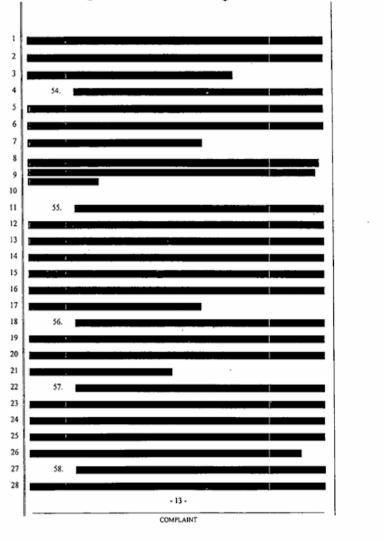 As Snap Inc. plans for an IPO, a former employee says he was fired for trying to reveal falsified metrics. Anthony Pompliano claims he was terminated only three weeks into his tenure at Snap Inc. running the new user growth and engagement team. Pompliano also charges Snap Inc. with hiring him from Facebook to get proprietary information.
As Snap Inc. plans for an IPO, a former employee says he was fired for trying to reveal falsified metrics. Anthony Pompliano claims he was terminated only three weeks into his tenure at Snap Inc. running the new user growth and engagement team. Pompliano also charges Snap Inc. with hiring him from Facebook to get proprietary information.
"We've reviewed the complaint. It has no merit. It is totally made up by a disgruntled former employee," said Mary Ritti, Snap's vice president of communications. The company also said Pompliano was fired because he was "incompetent" and "not adequately performing in his position."
Pompliano's attorney said, "Snapchat's leadership saw Mr. Pompliano as an impediment to their planned IPO because he refused to turn a blind eye to Snapchat's misrepresentations." (Snapchat is the former name of Snap Inc.) The claim also charges Snap Inc. with damaging the former employee's reputation and ability to find new work.
Business Insider posted the entire court filing, but several pages are heavily redacted, like the one shown here. These darken parts may represent proprietary Snap Inc. information.
This isn't the first time Snapchat's integrity has been questioned. In 2014, the company settled a claim with the Federal Trade Commission that it exaggerated how easily images sent through the app disappear. The news led to many doubting the safety of sending personal images.
Discussion:
- In what ways could Snap Inc. exaggerate metrics to potential investors? What do you think is the issue here?
- How credible do you find Pompliano's claim? How can a judge decide such a claim?
Comms About the LIRR Accident
 A Long Island Rail Road train derailed at the Atlantic station in Brooklyn, leaving 76 commuters injured. I never expect much from MTA communications: the last few train problems resulted in a flurry of scheduling messages but little in the way of empathy. This time seems no different.
A Long Island Rail Road train derailed at the Atlantic station in Brooklyn, leaving 76 commuters injured. I never expect much from MTA communications: the last few train problems resulted in a flurry of scheduling messages but little in the way of empathy. This time seems no different. 
A notice on the LIRR website and one tweet warn us to "anticipate possible delays," but subsequent tweets offer no other information or apology. A news conference, so far, is not to be found, but it's still early.
When the MTA has expressed empathy, it has taken a while, so we may see something later, and I'll update this post.
Discussion:
- As a priority, customers do need to know about delays, but why does the human stuff take so long for the MTA?
- Why is humanity important in these types of situations?
- Draft a few tweets and website updates. What could the organization say at this point?
In France, Employees Can Disconnect
 France passed a new law allowing employees the "right to disconnect" from email after their regulated 35-hour work week. French unions blame technology for causing an "explosion of undeclared labor," and we know something about this in the United States. Rather than ban after-work email, which may be impossible to achieve, the ruling requires companies to give establish new guidelines for emailing after work.
France passed a new law allowing employees the "right to disconnect" from email after their regulated 35-hour work week. French unions blame technology for causing an "explosion of undeclared labor," and we know something about this in the United States. Rather than ban after-work email, which may be impossible to achieve, the ruling requires companies to give establish new guidelines for emailing after work.
Some question whether the strategy will hurt France competitively; the country already has generous vacation and other benefits. However, the United States is notoriously behind the times with some labor laws. For example, we are the only industrialized nation without paid parental leave.
Companies have taken other steps to encourage employees to talk with each other face-to-face and to have a life outside of work. Limiting the hours when employees are expected to respond to email, discouraging email during vacations, and sending fewer of them are some common practices.
Discussion:
- What's your view of the new French law? What could be some positive and negative results?
- Short of instituting a new federal law, what can managers do to curb email within their organizations? Consider a few strategies-starting with the top, of course
Judgments People Make Within Seconds
 Business Insider tells us about eight judgments people make right after meeting you:
Business Insider tells us about eight judgments people make right after meeting you:
- If you're trustworthy
- If you're high status (based on clothing)
- If you're straight or gay
- If you're smart (based on eye contact, expressive speaking, and eye glasses)
- If you're promiscuous (based on tattoos)
- If you have a dominant personality (based on having a bald head)
- If you're successful (based on a man's suit)
- If you're adventurous (based on how you walk)
Business Insider identifies research institutions, but we don't see citations for further study. Each judgment seems to be based on one study, so I would be wary about drawing too many conclusions. Yet, we have plenty of research about quick impressions, particularly during job interviews.
Discussion:
- How are quick judgments helpful and harmful? They do serve a purpose, but what are the dangers?
- How does knowing about this research help you personally and professionally? For example, if you know that you make judgments with little information-knowingly or unknowingly-how can you ward against them?
Company Examples to Use in Your Classes
H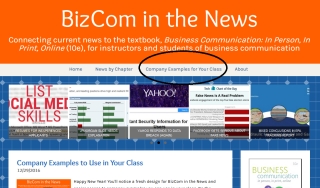 appy New Year! You'll notice a fresh design for BizCom in the News and easier access to company examples you can use in your classes. On the navigation bar under the title, select "Company Examples for Your Class" to see a list of chapters. For each, I'll post examples-videos, blog posts, letters, etc.-as I find them.
appy New Year! You'll notice a fresh design for BizCom in the News and easier access to company examples you can use in your classes. On the navigation bar under the title, select "Company Examples for Your Class" to see a list of chapters. For each, I'll post examples-videos, blog posts, letters, etc.-as I find them.
In almost every class, we talk about a news story or look at a company's communication. I find this approach engages students and shows them the relevance of what we teach. If you would like ideas on how to incorporate news in your class, I would glad to send you slides from an Association for Business Communication conference presentation and a webinar via Cengage Learning.
The news by chapter is now also in the navigation bar, and you can still use the search feature in the right-hand column.
Have a wonderful winter break,
Amy
Email: amynewman@cornell.edu

















